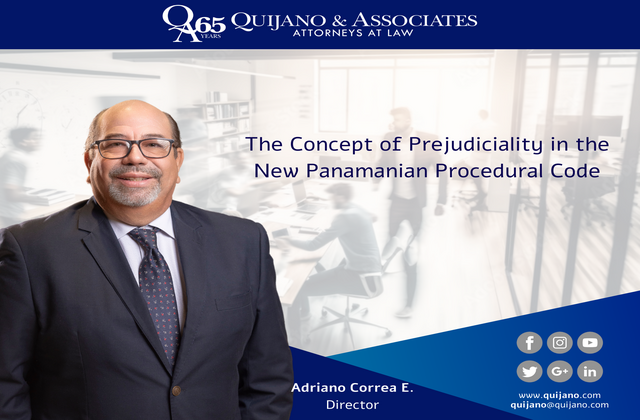The Concept of Prejudiciality in the New Panamanian Procedural Code

Prejudiciality is a procedural concept that requires the decision in which a decision on a matter is required prior to the judgment, as noted in the Dictionary of Civil Procedural Law, authored by Dr. Jorge Fábrega Ponce and Dr. Carlos H. Cuestas.
According to Davis Echandía, the notion of prejudiciality distinguishes between two concepts: logical prejudiciality and legal prejudiciality and he finds in them a genus-species relationship, with logical prejudiciality being the genus and legal prejudiciality being the species, since it is asserted that “everything that is legally prejudicial is also logically legal, but not vice versa.”
Article 7 of the new Judicial Code sets forth the concept of prejudiciality as follows:
Article 7. “If during the course of the proceedings issues arise that require or have required the intervention of another jurisdiction, the judge shall continue the proceedings without any suspension, and if, when ruling, a sentence has been issued in another jurisdiction, the civil judge must take into consideration what has been resolved by that jurisdiction to decide accordingly.
The exception is the consultation or warning of unconstitutionality, which does not suspend the proceedings, but the judge or magistrate must postpone the issuance of the final resolution until the consultation or warning is decided.”
This precept is not far removed from the content of Article 471 of our current code, which establishes that:
Article 471 “If during the course of the proceedings issues arise that require or have required the intervention of another jurisdiction, the civil judge shall continue the proceedings without any suspension, and if in ruling there is a sentence from another jurisdiction, the civil judge shall take into consideration what has been resolved by that jurisdiction to decide accordingly. Constitutional consultation cases are excepted.”
However, it can be observed that the concept of the national code only refers to the possibility of intervention by another jurisdiction, ignoring the other doctrinal possibilities that occur intra-procedurally without the intervention of a jurisdiction other than the civil one.
Furthermore, doctrine has classified legal prejudiciality into procedural and extra-procedural, now, in my opinion, in civil proceedings whenever there is an exception of prior and special pronouncement, or pronouncements of those dealt with by our code, there will be prejudiciality because the process cannot continue until this matter is resolved; for example, in the new Judicial Code, Article 407 establishes that:
Article 407 Exceptions of prior and special pronouncement.
“The following will be resolved as exceptions of prior and special pronouncement: res judicata, the extinction of the claim due to expiration of the instance, judicial transaction, and the withdrawal of the claim.
Expedited treatment will be given to prescription, despite its nature, by handling it and categorizing it as an exception of prior and special pronouncement…”
The same could be said regarding incidents of nullity, which are regulated in Article 304 and following of the new procedural code, as it is needless to say that if the alleged nullity arises from facts preceding the initiation of the process or concurrent with its initiation, the party must promote it no later than within 5 business days following the expiration of the term to respond to the complaint. Therefore, in our view, an incident of nullity questioning the legitimation ad causam or ad procesum finds no justification for not paralyzing the process until it is determined whether or not is the who can sue, all this by virtue of the principle of procedural economy.
We say this because Article 310 of the new procedural code indicates that incidents do not interrupt the course of the process, and if the incident can influence the decision, it must be resolved before the judgment, but this does not aid procedural economy, as a file with nullity features would have been processed, and it would be necessary to wait for the practice of evidence and arguments, no matter how oral the process is, when this could be a cause for inadmissibility or rejection of the claim, thus producing this type of prejudiciality within the file.
As can be seen, the concept of prejudiciality in our new code remains unchanged, and the judge, due to the fact that it is not explicitly established, may or may not take into consideration (due to the independence of civil or criminal actions), even if it is the same evidence to be practiced, the decision of the other jurisdiction and thus a person who is found not responsible in a criminal proceeding has the action to be sued in a c civil proceeding, thereby promoting the already high litigation rate in our country.”




